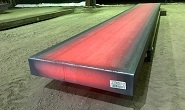Government/Policy

September 1, 2020
Trump Tightens Quota on Slabs from Brazil
Written by Tim Triplett
The Trump administration has announced a tightening of Brazil’s steel quota that will sharply reduce the tonnage of steel slabs imported into the U.S. for the rest of the year.
“In light of recent deterioration in market conditions brought on by the COVID-19 pandemic affecting domestic steel producers, the United States has deemed it necessary to reduce the remaining quota for Brazilian semifinished steel products for the remainder of 2020 to 60,000 metric tons, down from 350,000 tons, but will maintain existing quotas for other steel products,” said U.S. Trade Representative Robert Lighthizer. “The United States will hold consultations with Brazil about the semifinished steel quota for 2021 in December, by which time we hope market conditions will have improved.”
In 2018, Brazil agreed to a quota covering 70 percent of the country’s average finished steel exports to the U.S, in addition to a 100 percent quota on semifinished exports, including slabs and billets. The arrangement granted the country immunity from the 25 percent Section 232 tariff. So far, the country’s annual quota of 3.5 million metric tons of Brazilian semifinished steel remains unchanged for 2021.
The administration’s move to curb imports was endorsed by the American Iron and Steel Institute. “We appreciate the efforts of the administration to address steel import issues affecting American producers during this difficult time when the market for steel has declined significantly due to COVID-19,” said Kevin Dempsey, AISI interim president and CEO. “While we are seeing some modest recent improvement in market conditions, the industry continues to face significant challenges due to the sharp drop in demand this year as a result of the pandemic. So far in 2020, raw steel production is down 20 percent compared to the same period last year and steelmaking capacity utilization has only averaged approximately 66 percent, compared to nearly 81 percent during the same period last year. These difficult conditions make the industry even more vulnerable to surges in imports.”
(Editor’s note: See Leibowitz on Trade for further commentary on this subject.)







